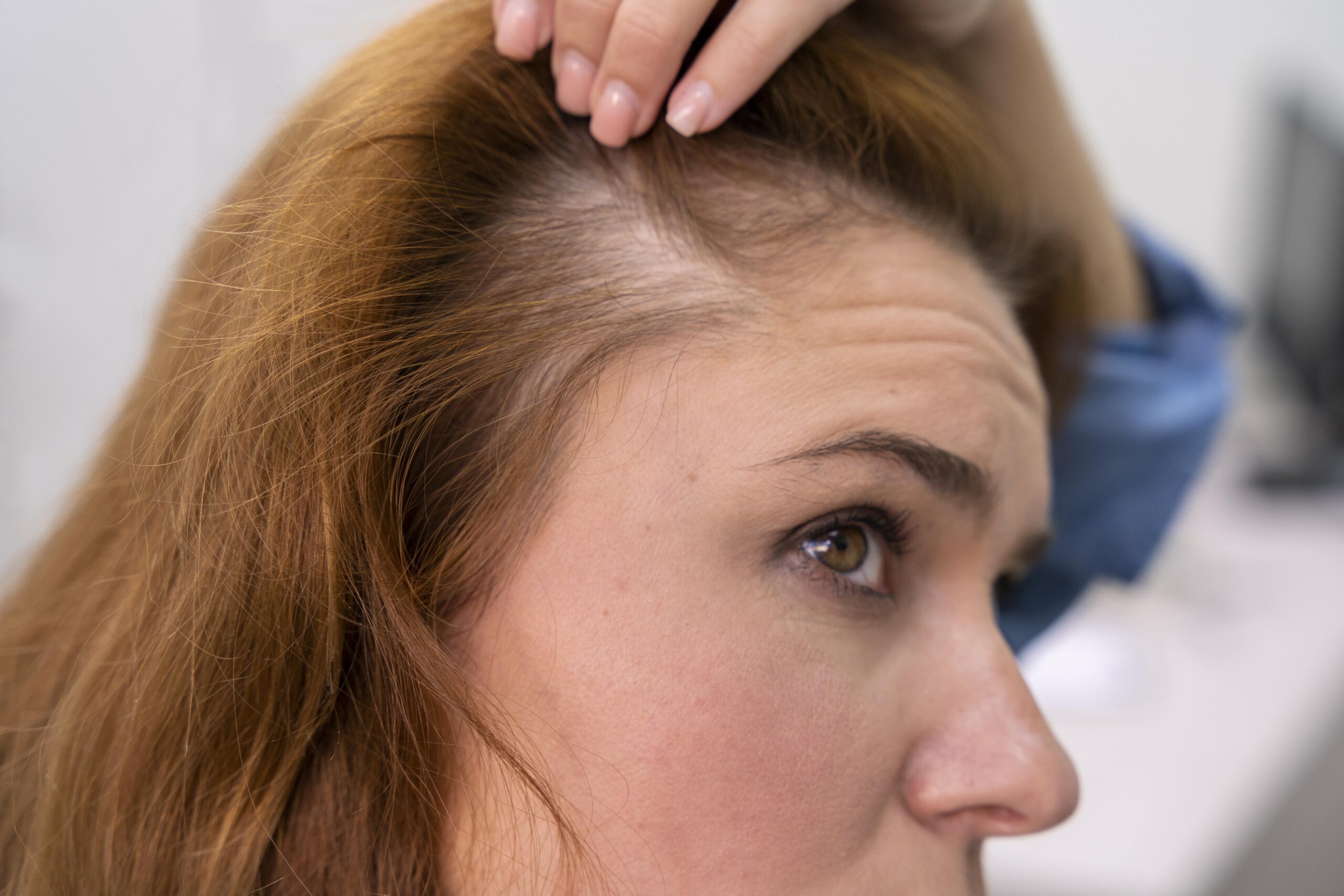Alopecia/Indralupta
Home
Alopecia/Indralupta
Ayurvedic Medicine for Hair Loss: Causes, Remedies & Lifestyle Practices
Hair is considered a vital aspect of beauty and health in Ayurveda. Hair loss, medically termed Alopecia and traditionally known as Indralupta, is a common concern affecting both men and women. It can occur as patchy hair loss, gradual thinning, or complete baldness. While modern medicine often relies on topical solutions or medications, Ayurveda offers a holistic approach, focusing on balancing the doshas, improving digestion (Agni), detoxifying the body, and nourishing hair naturally.
This article explores the causes of alopecia, its Ayurvedic perspective, diet and lifestyle modifications, therapies, herbal remedies, and exercises that can help prevent and treat hair loss effectively.

Understanding Alopecia/Indralupta in Ayurveda
In Ayurveda, hair health is closely linked to Rakta dhatu (blood tissue), Majja dhatu (bone marrow and nervous tissue), and Ojas (immunity/essence of body). Hair is considered a by-product of proper nourishment of these tissues. Imbalance in Vata, Pitta, and Kapha doshas can disrupt nourishment and lead to hair fall.
- Pitta imbalance: Causes premature graying, hair thinning, and inflammation of the scalp.
- Vata imbalance: Leads to dry scalp, brittle hair, and hair breakage.
- Kapha imbalance: Can cause excessive oiliness and weak hair roots, leading to shedding.
Alopecia occurs when the hair follicles fail to receive adequate nutrition, sometimes aggravated by seasonal changes, lifestyle factors, or chronic illnesses.
Symptoms of Alopecia
- Patchy hair loss on scalp or body
- Gradual thinning of hair all over the scalp
- Premature graying of hair
- Dry and brittle hair with split ends
- Excessive shedding or breakage
- Weak hair roots and slow hair growth
Causes of Alopecia/Indralupta
Ayurveda identifies several internal and external factors that lead to hair loss:
- Dosha Imbalance – Predominantly Pitta or Vata derangement affecting hair nourishment.
- Genetic Predisposition – Family history of baldness or alopecia increases risk.
- Poor Digestion (Mandagni) – Accumulation of Ama (toxins) in the body affects hair growth.
- Nutritional Deficiency – Lack of iron, protein, Vitamin B12, and essential fatty acids.
- Stress and Lifestyle – Excessive mental stress or lack of sleep aggravates Vata, causing hair fall.
- Hormonal Imbalance – Thyroid disorders or androgenic imbalance leading to thinning or patchy hair.
External Factors – Pollution, dust, chemicals, and harsh hair treatments.
Ayurvedic Line of Treatment (Chikitsa)
Ayurvedic treatment aims at treating the root cause rather than just suppressing symptoms. The three main principles:
- Shodhana (Detoxification) – Remove toxins using Panchakarma therapies.
- Shamana (Pacification) – Balance doshas using herbal medicines and diet.
- Rasayana (Rejuvenation) – Strengthen hair follicles and promote natural hair growth.
Diet Recommendations (Ahara)
Diet plays a crucial role in hair health, according to Ayurveda.
Foods to Avoid
- Fried and oily foods
- Excessive sugar and processed items
- Fermented foods and alcohol
- Excess dairy (if Kapha imbalance is present)
- Junk food that weakens digestion
Foods to Include
- Protein-rich foods – legumes, nuts, seeds, and lean meats (if non-vegetarian)
- Vitamin-rich fruits – amla, pomegranate, guava, papaya
- Vegetables – spinach, drumstick leaves, fenugreek, and bitter gourd
- Ayurvedic herbs – Bhringraj, Amla, Ashwagandha, Yashtimadhu
- Healthy fats – sesame oil, coconut oil, flaxseeds for scalp nourishment
- Whole grains – barley, millet, and oats for easy digestion
A daily spoon of Chyawanprash can help boost immunity and hair vitality.
Lifestyle Practices (Vihara)
- Pranayama and Yoga – Anulom Vilom, Kapalbhati, and Bhramari Pranayama improve blood circulation to the scalp. Yoga asanas like Bhujangasana, Sarvangasana, and Shirshasana promote hair health.
- Stress Management – Meditation, adequate sleep, and relaxation help reduce Vata-Pitta imbalance.
- Scalp Care – Oil massage (Abhyanga) with Bhringraj, Amla, or coconut oil nourishes hair follicles.
- Avoid Harsh Chemicals – Minimize exposure to dyes, heat styling, and harsh shampoos.
- Hydration – Drink plenty of warm water or herbal teas to flush toxins.
Herbal Remedies (Aushadhi)
Ayurveda relies on natural herbs and oils to restore hair health:
- Bhringraj (Eclipta alba) – Promotes hair growth, prevents graying
- Amla (Indian Gooseberry) – Rich in Vitamin C, strengthens follicles
- Ashwagandha – Reduces stress and strengthens scalp nerves
- Brahmi – Enhances hair density and reduces hair fall
- Neem – Purifies blood and reduces scalp infections
- Fenugreek (Methi) – Strengthens hair and prevents breakage
- Coconut Oil & Sesame Oil – Used as base oils for nourishment
(Dosages and therapies should be under guidance of an Ayurvedic doctor.)
Medications
Ayurvedic formulations for alopecia may include:
- Chyawanprash – General rejuvenator
- Hair tonics – Bhringraj taila or herbal syrups
- Sitopaladi Churna – Strengthens follicles and improves immunity
- Triphala & Triphala Guggulu – Detoxifies body and improves digestion
Preventive Measures
- Avoid stress and maintain proper sleep
- Follow a nutrient-rich, dosha-balanced diet
- Practice regular yoga and scalp massage
- Avoid chemical exposure and harsh hair treatments
- Maintain good hygiene and scalp cleanliness
Ayurvedic Therapies (Panchakarma & Kriya)
- Shirodhara – Continuous stream of medicated oil on the forehead reduces stress and balances Pitta.
- Nasya – Herbal oils administered through nostrils strengthen hair roots and reduce premature hair fall.
- Raktamokshana – Bloodletting therapy (in select cases) to remove toxins causing hair loss.
- Abhyanga & Swedana – Scalp massage and steam therapy improve blood circulation and follicle nutrition.
- Herbal hair packs – Bhringraj, Amla, Brahmi, and Fenugreek paste applied regularly promotes hair regrowth.
Conclusion
Alopecia or Indralupta is not merely hair loss; it is an indicator of underlying imbalances in the body. Ayurvedic medicine for hair loss treats the root cause by balancing doshas, detoxifying the system, nourishing hair follicles, and strengthening immunity. By combining herbal remedies, Panchakarma therapies, diet management, and lifestyle practices, one can effectively reduce hair fall, promote regrowth, and maintain long-term hair health.
